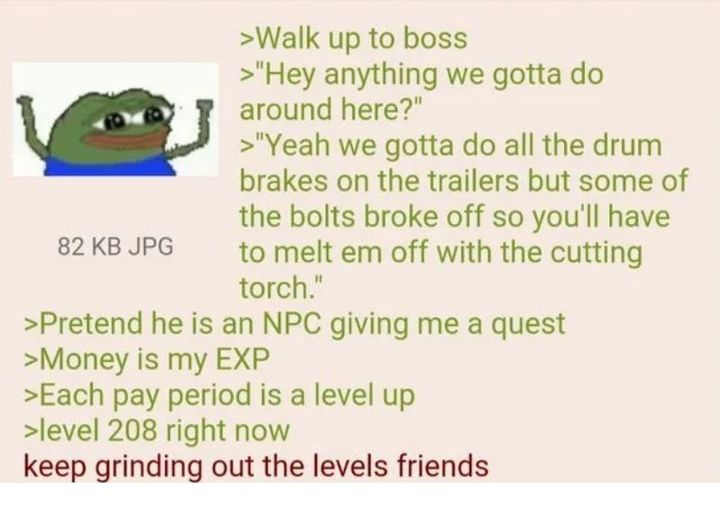this post was submitted on 29 Jul 2024
773 points (98.5% liked)
Greentext
4452 readers
506 users here now
This is a place to share greentexts and witness the confounding life of Anon. If you're new to the Greentext community, think of it as a sort of zoo with Anon as the main attraction.
Be warned:
- Anon is often crazy.
- Anon is often depressed.
- Anon frequently shares thoughts that are immature, offensive, or incomprehensible.
If you find yourself getting angry (or god forbid, agreeing) with something Anon has said, you might be doing it wrong.
founded 1 year ago
MODERATORS
you are viewing a single comment's thread
view the rest of the comments
view the rest of the comments

That's a very creative and roundabout way of saying you do expect to be paid for your work and would quit your job if they quit paying you.
No, I'm saying I would stick with my job for 1-2 years if I didn't need the money and they stopped paying me. I'm not going to work for free while I need money, but I'd be happy to work for free once I no longer need money.
You said, and I quote:
That's payment. For your work.
It doesn't change that fact whether they are paying you before the work is done or after. It's still a transaction. You contribute time and effort to them, they contribute compensation to you for that time and effort.
And everyone needs money, it's just that some have more than others.
If you hit the lottery tomorrow and won 500 million dollars, maybe not immediately, but you would almost definitely not continue to work at your job volunteering your time and labor to help them make money (and if you would, you shouldn't, because that devalues the labor of your coworkers and everyone else in your field).
Mind you, I'm not at all saying this is a bad thing. If anything, it's a good thing. I'm not sure why you seem to feel the need to make yourself an exception, but really, the only people I've encountered who are an exception to this rule are people who are both working in a field where the labor itself is intrinsically rewarding (teachers, caregivers, medical professionals, artists, chefs, brewers, etc.) and would be financially supported by another when the pay stopped (usually a spouse but sometimes wealthy parents, etc.).
And in those cases, it's really not even an exception so much as it is splitting the circumstance across two people, because even then, they're just getting a free ride to do what they want and ignore the need for money that drives the labor market.
I'm also certainly not saying "everyone hates their job". Lots of people enjoy their work and that's great! But for the vast majority of people, if they were no longer to receive a paycheck from their employer, they'd do something else. Either because they needed money, or because there are things they'd enjoy even more than their job that they can do with that time. It's not a criticism, just an observation.
You’ve set up a scenario where one person no longer has to work and if they didn’t then why would they continue contributing to a company they get nothing from. Your scenario is disingenuous. Instead imagine a world where no one is paid. How many of those people would work doing what they are now vs stop working entirely. That’s the scenario where “people don’t want to work” truly matters.